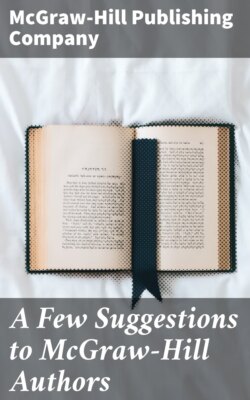Читать книгу A Few Suggestions to McGraw-Hill Authors - McGraw-Hill Publishing Company - Страница 4
I
UNIFORMITY AND STANDARDS
ОглавлениеThe purpose of these suggestions is fourfold:
(1) To assist our authors in preparing their manuscripts and in understanding the general process of publication.
(2) To lighten the burden of the editors, typesetters, and proof-readers in securing uniformity and adherence to high standards.
(3) To avoid complications and delays and—worst of all—the item of author's corrections.
(4) To obtain a standard of editorial details as uniformly high as that of the subject-matter of our books.
Let it be understood, first of all, that these are suggestions, not rules. Although we endeavor to maintain high standards, we do not insist upon uniformity of style or consistency throughout the books in our widely diversified list. The editor of a periodical or the proceedings of a society properly insists upon uniformity, generally issues a style sheet to guide his contributors, and edits all manuscript to fixed standards. But since our books cover nearly all branches of science, we feel that absolute uniformity would accomplish no good purpose.
Throughout a single manuscript, however, in details of punctuation, spelling, abbreviation, compounding of words, side- and center-headings, notation, bibliographic references, etc., we do ask for the adoption of a conservative, well-recognized standard. Even uniformity throughout a manuscript seems, curiously enough, most difficult to secure, although the lack of it leads to misunderstandings, delays and author's corrections, with their attendant avoidable expenses.
We have used the phrase "conservative, well-recognized standard" advisedly. Departure from such standards, either in spelling, punctuation, systems of notation or otherwise, is not advisable, for whatever convictions the author and the publisher may have it is quite certain that the majority of the readers of any given book will be conservative and more often annoyed than otherwise by any radical departures from common practice.
Without reference to our own views on simplified spelling, for example, we are confident that the radical simplified speller is neither surprised nor disturbed to find in a book what he would term old-fashioned spelling. The conservative speller, on the other hand, is shocked even at tho and thru, and the book suffers accordingly. Nevertheless, we have no quarrel with sulfur in our manuscripts on chemical subjects, or with any other spelling which has been approved officially by the leading technical society in the particular field of the manuscript.
To secure consistency in details throughout his manuscript it is best for an author to adopt as his guides, at the very beginning of his work, some standard unabridged dictionary and an authoritative writer's manual, and to stick to these alone until his book is on the market. By this method he will give his book not only a high standard but uniformity in details.
